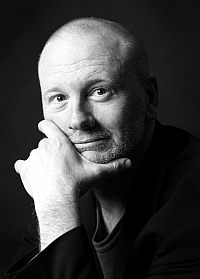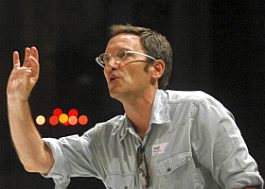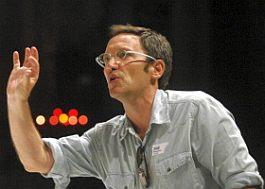
Brett Dean is on a roll. In the past few years, the 48-year-old Brisbane native has conducted and recorded (for BIS) his Viola Concerto and worked with some of the world’s finest orchestras, including the Los Angeles Philharmonic and Berlin Philharmonic, where he played viola for 16 years. That orchestra’s celebrated conductor, Simon Rattle, encouraged Dean’s nascent compositional career, and this year led the Royal Liverpool Philharmonic in the premiere of three arias from Dean’s first opera, Bliss, which debuts next year. Last year, Ensemble Wien-Berlin performed the premiere of his chamber work Polysomnography, a Lucerne Festival commission, and he’s featured composer at this year’s Santa Fe Chamber Music Festival and Cabrillo Festival.
Dean’s breakthrough stretch culminated in winning the world’s largest composition prize, the 2009 Grawemeyer Award, for his violin concerto The Lost Art of Letter Writing; Dean himself conducted the Royal Concertgebouw Orchestra in its premiere.
Bay Area audiences get a double dose of one of Australia’s finest composers when Brett Dean returns to this year’s Cabrillo Festival for the U.S. premieres of his 2000 work Amphitheatre (inspired by an ancient Roman one described in Michael Ende’s children’s book Momo) and 2004’s Moments of Bliss, which Dean describes as “a suite of four purely orchestral movements that will form the basis for several orchestral interludes throughout the opera,” which is based on the celebrated novel by Australian author Peter Carey, later made into a popular film. The music reflects various moods — an amorous encounter, a heart attack, a visit to hell, and a contemplation of life’s vicissitudes.

As celebrated as he is in his home country, Dean is hardly the best-known composer in Cabrillo’s opening weekend. That honor goes to Osvaldo Golijov, probably the hottest composer alive, who’ll be in Santa Cruz for the opening night performance of his 2007 cello concerto, Azul (Blue). Unsatisfied with his original version (composed for Yo Yo Ma and itself based on an earlier piece for soprano and string quartet), the Boston-based Argentine-American composer substantially revised it — by press accounts to magnificent effect — for the brilliant young cellist Alisa Weilerstein, who’ll play it in Santa Cruz. Employing electronically enhanced “hyper-accordion” and extensive percussion and partly inspired by a Pablo Neruda poem, Azul traverses characteristically eclectic territory, from Baroque to tango to Middle Eastern influences. Golijov has composed at least two absolute masterpieces and this is a great chance to hear an important, and hitherto unrecorded, recent work.
Along with Azul and Amphitheatre, the opening night program features the world premiere of David Heath’s Rise From the Dark — a piece he wrote almost a quarter century ago. Like much of the Scottish composer's work, including 2007's Cabrillo world premiere Colourful World, this one is “based rhythmically and harmonically on the music of John Coltrane and Miles Davis, and structurally on classical music,” says Heath's program note.
The festival has always been a showcase for emerging compositional talent, and it’s a welcome to see Music Director Marin Alsop refreshing her regular corps of contemporary composers with young blood. The August 8 concert features intriguing works by composers born in the 1970s, including the U.S. premiere of Mexican composer Enrico Chapela’s 2003 ínguesu. In seeking a model for a modern nationalistic work, he looked to sports — specifically the Mexican soccer team’s stirring 1999 triumph over Brazil in the Confederation Cup championship in Mexico City.
Assigning roles to each instrumental group (brass to Brazilians, strings to audience, and so on), Chapela then contrived the musical themes (based on Mexican and Brazilian folk tunes and sports chants) to match the game’s significant moments, sort of like a modern version of Debussy’s Games or Stravinsky’s Card Game.
The final work, Avner Dorman’s 2006 Spices, Perfumes, Toxins!, marks the second year in a row the Israeli composer’s music has spiced Cabrillo’s menu. It combines Middle Eastern percussion and scales, Indian rhythmic structures, jazz sonorities, Baroque references, and minimalist elements — a microcosm of the multifarious ingredients embraced by today’s polycultural composers.

